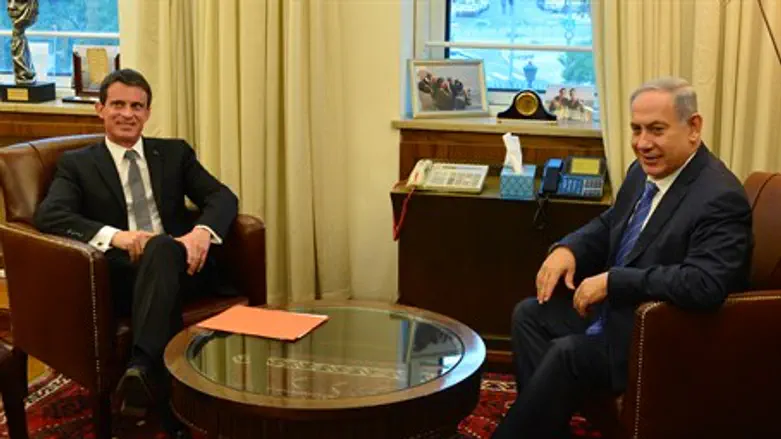
Israeli Prime Minister Binyamin Netanyahu rejected a multilateral French "peace initiative" as he met his French counterpart on Monday, offering instead to hold direct talks with Palestinian president Mahmoud Abbas in Paris.
French Prime Minister Manuel Valls said he would speak to President Francois Hollande about Netanyahu's proposal.
Direct negotiations with the Palestinian Authority are "the only way to proceed to peace," Netanyahu said. He offered "a different French initiative" of face-to-face talks with Abbas in Paris.
Despite Netanyahu's rejection of the French initiative, the Israeli premier began by thanking Valls for his "commitment to Franco-Israeli relations" and "stalwart position against anti-Semitism and that of Francois Hollande."
Netanyahu also thanked Valls for his recent statement acknowledging that France's support for a UNESCO vote which denied the Jewish connection to the Temple Mount was a mistake.
"I have to be honest: I wrote a letter to Francois Hollande and expressed my shock that France had voted for a decision denying the Jewish people's link to the Temple Mount, which spans thousands of years," Netanyahu related. "And the reason that this vote was so troubling for us is that it implies that the Jewish people have no right to be here. And I think that remains the core of the conflict, the refusal to recognize the right of the Jewish people to have a nation-state in their ancestral homeland.
"I hope you encourage other nations that voted for this outrageous resolution to follow your lead and admit it was an error. And of course, the most important thing is that it doesn't happen again."
Moving on to the French peace initiative, Netanyahu stated: "though we have some disagreements on the best way to achieve peace, I deeply appreciate your commitment to pursue it.
"I know how much you care about ending the terrible violence that has plagued our region for far too long, and I want to thank you and President Hollande for your commitment to peace."
"We share the same goals: peace, two states for two peoples, an end to war," he added, but emphasized his position that the only way to end the conflict is via direct talks, without preconditions.
"This weekend you said that direct talks are very difficult right now," he told Valls, citing comments in which the French PM explained the rationale behind engineering a "peace summit" to which neither Israelis nor Palestinians were invited. "And you're right. They are, but they're the only way to proceed towards peace."
"Peace just does not get achieved through international conferences, UN-style," said Netanyahu. "It doesn't get to fruition through international diktats or committees from countries around the world who are sitting and seeking to decide our fate and our security when they have no direct stake in it.
"Peace is achieved through direct negotiations between the parties and in direct negotiations, the Palestinian leadership must face a stark choice and this choice is simple: recognize the Jewish state or continue educating your people that one day Israel will be gone."
The PA, he said, seeks to "create a Palestinian state not to live side-by-side next to Israel, but to eliminate Israel."
"The Palestinian leadership doesn't see the French initiative as an inducement to compromise, but rather as a way to avoid it," Netanyahu insisted. "In fact, the Palestinian Prime Minister, Hamdallah, let slip the other day his hope for an imposed timetable, rather than a negotiated peace.
Noting how Israel made peace via direct negotiations with Arab neighbors Jordan and Egypt, Netanyahu reiterated his willingness "to make difficult decisions," if PA leader Mahmoud Abbas would simply agree to direct talks.
"That's why I would gladly accept a different French initiative, and here's the one important change. This initiative can still take place in Paris, because that would be a marvelous place to sign a peace accord," Netanyahu offered.
"It's a marvelous place anyway. It can still be called the French initiative, because you would host this genuine effort for peace, but here's the difference: I will sit alone directly with President Abbas in the Élysée Palace, or anywhere else that you choose. Every difficult issue will be on the table: mutual recognition, incitement, borders, refugees and yes, settlements – everything.
"There is no issue too complex to solve if both sides are willing to talk to each other. And I am more than willing; I am eager. I was injured in battle; I lost a brother; I lost many friends in battle. Israel wants nothing more than peace. And I hope you encourage President Abbas to accept this French initiative: direct negotiations without preconditions, between the Israeli prime minister, the Palestinian president in Paris."
"I'm ready to clear my schedule and fly to Paris tomorrow," he added, before quipping: "well, I think tomorrow we're expanding the government, but the day after tomorrow."
Valls is visiting Israel and the Palestinian Authority to advance his country's plan to restart Israeli-Palestinian peace efforts.
The "peace conference," scheduled for June 3, has been panned by Israel but welcomed by the PA. It would essentially involve world powers - without Israeli or PA representatives in attendance - deciding on a solution to the conflict, and would be followed by a second conference in the autumn to which Israelis and Palestinians would be invited.
France says the goal is to eventually restart negotiations that would lead to a Palestinian state.
Netanyahu in particular has criticized the initiative and called for direct negotiations between the two sides.
Negotiations between the Israelis and Palestinians have been at a standstill since a US-led initiative collapsed in April 2014.
Netanyahu has repeatedly offered to meet Abbas for direct talks, but the PA leader has declined to respond, instead taking unilateral actin via the United Nations and other international bodies, in violation of previous agreements with Israel.
AFP contributed to this report.